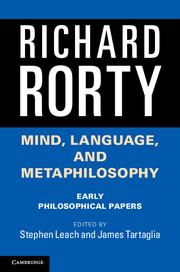Book contents
- Frontmatter
- Contents
- Foreword
- Acknowledgments
- Introduction
- 1 Pragmatism, categories, and language
- 2 The limits of reductionism
- 3 Realism, categories, and the “linguistic turn”
- 4 The subjectivist principle and the linguistic turn
- 5 Empiricism, extensionalism, and reductionism
- 6 Mind-body identity, privacy, and categories
- 7 Do analysts and metaphysicians disagree?
- 8 Incorrigibility as the mark of the mental
- 9 Wittgenstein, privileged access, and incommunicability
- 10 In defense of eliminative materialism
- 11 Cartesian epistemology and changes in ontology
- 12 Strawson’s objectivity argument
- 13 Verificationism and transcendental arguments
- 14 Indeterminacy of translation and of truth
- 15 Dennett on awareness
- 16 Functionalism, machines, and incorrigibility
- Index of names
- References
11 - Cartesian epistemology and changes in ontology
Published online by Cambridge University Press: 05 June 2014
- Frontmatter
- Contents
- Foreword
- Acknowledgments
- Introduction
- 1 Pragmatism, categories, and language
- 2 The limits of reductionism
- 3 Realism, categories, and the “linguistic turn”
- 4 The subjectivist principle and the linguistic turn
- 5 Empiricism, extensionalism, and reductionism
- 6 Mind-body identity, privacy, and categories
- 7 Do analysts and metaphysicians disagree?
- 8 Incorrigibility as the mark of the mental
- 9 Wittgenstein, privileged access, and incommunicability
- 10 In defense of eliminative materialism
- 11 Cartesian epistemology and changes in ontology
- 12 Strawson’s objectivity argument
- 13 Verificationism and transcendental arguments
- 14 Indeterminacy of translation and of truth
- 15 Dennett on awareness
- 16 Functionalism, machines, and incorrigibility
- Index of names
- References
Summary
Many philosophers nowadays ignore or ridicule traditional ontology, but few are happy with the breezy “refutations” of metaphysics which were fashionable a decade or two ago. On the one hand, quarrels between Absolute Idealists and Physical Realists, interactionists and epiphenomenalists, process philosophers and substance philosophers, seem as inconclusive as ever. Even streamlined versions of old ontological theses (for example Strawson’s claim that material objects are basic particulars or Quine’s that we can get along with physical objects and classes) do little more than excite a certain languid admiration of their authors’ ingenuity. On the other hand, few of us can swallow the notion that Plato, Aquinas, Spinoza, Kant, Russell, and Whitehead were simply “confused about language.” Even if one suspects that the systems they erected simply worked out the absurd consequences of a few blunders, one wants a longer story about how some of the most intelligent men who ever lived made such blunders, and about why they devoted their lives to piling paradox upon paradox.
I do not think that a satisfactory story of this sort has yet been told. Most such stories either blithely dismiss pre-twentieth-century philosophy or else make what is, I suspect, a serious mistake. The mistake is the assumption that there is a single discipline called “ontology” or “metaphysics” which was practiced by Aristotle, Aquinas, Descartes, Hegel, Whitehead, and Russell, and which is still being practiced by Quine, Strawson, Sellars, and J. J. C. Smart. It is tempting to think that we shall always come back to the good old metaphysical problems despite changes in jargon, for this way of viewing the matter also suggests that no radical change has occurred. On this view, the rise of “analytic” philosophy is just a change of idiom, and the positivistic rejection of metaphysics was just juvenile rhetoric, on a par with Descartes’s self-deceptive attacks on the scholastics.
- Type
- Chapter
- Information
- Mind, Language, and MetaphilosophyEarly Philosophical Papers, pp. 208 - 226Publisher: Cambridge University PressPrint publication year: 2014
References
- 2
- Cited by



